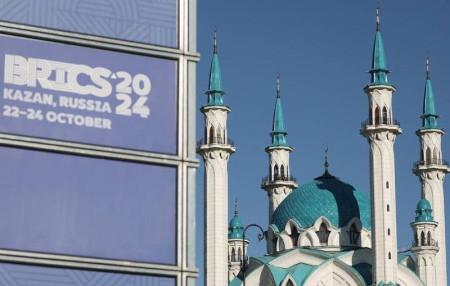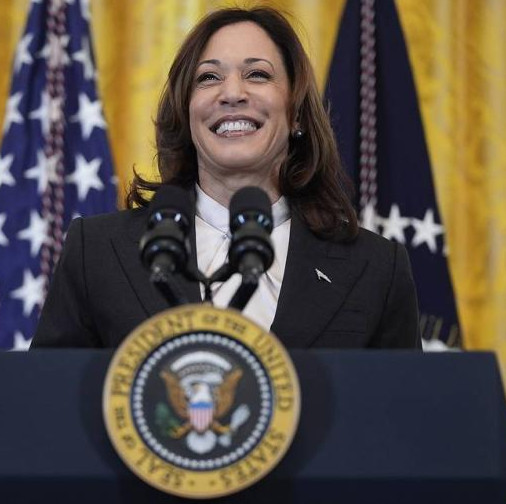
- Press review: US lets Kiev use anti-personnel mines and Iran may halt uranium enrichment
- Press review: Uranium costs soar as Moscow updates nuclear doctrine and US OKs attacks
- Press review: Russian air defenses can down Western missiles as EU conducts live exercise
- G20 leaders adopt Rio de Janeiro Summit Declaration
Russia’s Kazan in the Volga region is gearing up for the BRICS summit, the US intelligence data on Israel’s potential strike on Iran has been leaked, and Donald Trump gets ahead of Kamala Harris in a presidential race. These stories topped Monday's newspaper headlines across Russia, according to TASS News Agency.
Izvestia: BRICS summit to kick off in Russia’s Kazan
Discussing the ways of resolving the Ukraine conflict is not on the agenda of the Kazan BRICS summit but any participant may raise this issue at their discretion, Kremlin Spokesman Dmitry Peskov told Izvestia. The three-day summit’s main events will begin on October 22. Delegates will discuss the key issues of the global economy and politics, such as interaction in the security sphere, a reform of the international financial system, the development of inter-bank cooperation and the expansion of mutual payments in national currencies. Experts note that the BRICS summit may become the largest-scale international event ever held in Russia, asserting that attempts to isolate it politically or economically have failed.
"The fact that Russia has managed to organize an event on such a scale is a clear sign that BRICS has succeeded as an important international venue. It has been recognized by many countries with serious global clout and they are viewing Russia as an important partner in their foreign relations," Sergey Ordzhonikidze, former UN deputy secretary general and ex-deputy head of the Russian Foreign Ministry, told the newspaper.
According to the expert, for Russia, the BRICS summit is one of the largest international events of a geopolitical significance. The scale of the summit indicates that Russia’s international clout has not been undermined, as the West had hoped, and the country has not been isolated.
"BRICS has demonstrated a stable economic growth and many would like to be involved in this. Many businessmen from so-called unfriendly countries are currently seeking ways of joining various BRICS-related projects via intermediaries," Alexey Martynov, director of the International Institute of the Newly Established States and an associate professor at the Financial University under the Government of the Russian Federation, told Izvestia.
Vedomosti: US intel on Israel plotting strike on Iran leaked
The United States has launched a probe into a leak of "highly classified" US intelligence about Israel’s plans to retaliate for Iran’s October 1 attack, CNN, Axios and Associated Press (AP) reported citing several sources in the government. On October 18, the pro-Palestinian Middle East Spectator Telegram channel published documents dated October 15 and 16, compiled by the National Geospatial-Intelligence Agency. The documents may have been published within the Five Eyes intelligence alliance comprising Australia, Canada, New Zealand, the United Kingdom, and the United States.
According to the leaked documents, the Americans registered the deployment of air-launched ballistic missiles (ALBM) to Ramon and Ramat David airbases where F-16 and F-35 fighters are stationed, as well as to Hatzerim Airbase housing F-15s. Additionally, on October 15, Israeli pilots conducted low-altitude aerial drills.
According to military expert Yury Lyamin, current information is believed to be true. Meanwhile, one cannot completely rule out the possibility that the leaked documents serve as disinformation.
Using air-launched ballistic missiles will enable launches without getting too close to Iran’s airspace, while Iranian air defense systems are particularly vulnerable when dealing with this type of missiles, the expert added.
Over fifty air-launched ballistic missiles can deliver a serious strike, but the impact of the potential attack depends on its targets, Lyamin stressed. It is necessary to keep in mind that in Iran, some areas are better protected by air defenses than others, while various facilities have a varying degree of vulnerability. For example, a projectile base built deep under the mountains will be incomparably better protected than any large industrial enterprise above the ground, the expert concluded.
Kommersant: Trump turns the tide of presidential race
The pre-election heat in the US is up. Apparently, Democratic presidential nominee Kamala Harris’ "honeymoon," which started after she joined the presidential race in late July, is coming to an end. While neither candidate has got a substantial edge, approval ratings of her rival, ex-US President Donald Trump, are growing. The Republican candidate has bolstered his positions both in key swing states and nationwide. According to sociologists, the tendency of the race has changed which, if continued, may bring the former president back to the White House.
Chief strategist for Republicans Overseas Erol Morkoc in an interview with the Sun noted that "He's got a commanding lead in each of the swing states. As far as polling goes, if the polls are tied people are afraid to say how they'll vote."
According to the expert, the voters may claim support for Harris when polled while actually will cast their vote for Trump.
Former US Congressman Doug Collins (Republican, Georgia) told Fox News that usually the Republicans are trailing the Democrats in early voting by 10-15, even 20 percentage points, during the first week, while currently they are neck and neck, or even ahead, which has never happened before, according to the politician.
"Starting to see some Trump leads in high-quality national polls, which is certainly not a great sign for Harris. Very close race though," American analyst and statistician Nate Silver wrote on his X account.
Kommersant: Moldova to hold runoff presidential election
On Sunday, Moldova simultaneously held the first round of the presidential election and a referendum on changing the constitution in order to join the European Union. The results will determine the strategy of the country’s development which previously balanced between Russia and the West and began to promote the integration with the Euro-Atlantic community under President Maia Sandu. While Moscow is not commenting on the Moldovan election, EU and NATO leaders openly called on Chisinau to opt for the European future and join their policy on containing Russia on the post-Soviet space.
Preliminary election results were revealed on Sunday night. According to the Central Election Committee, incumbent President Sandu garnered the most votes, trailed by Moldova’s former Prosecutor General Alexandr Stoianoglo, previously sacked by Sandu.
Amid these developments, ex-Moldovan President Igor Dodon urged voters to come to the polls to prevent Sandu from being re-elected, painting an apocalyptic scenario for the country in the event of her victory. "I am begging you not to be manipulated and analyze the situation thoroughly. The result of this election depends on your vote. If you don’t like Stoianoglo, vote for any other candidate, just not for Maia Sandu. The fate of our country is in your hands," he wrote on his Telegram channel. According to Dodon, if Sandu wins, then the Moldovans who are currently abroad will have nowhere to return to and in general, "Moldova will not survive her next presidency."
"Had the election been held without a referendum, the authorities would have nothing to talk about because they are constantly lying about their achievements," former Prime Minister Vladimir Filat, leader of Moldova’s Liberal Democratic Party said on the eve of the election.
Vedomosti: Russia's Central Bank likely to raise key rate
The Bank of Russia’s Board of Directors will again raise the key rate at the upcoming October 25 meeting, all analysts polled by Vedomosti said.
Igor Rapokhin, senior analyst at SberCIB Investment Research, suggests that the Central Bank may even up the key rate to 21% in order to compensate for pro-inflation effects of the expanding budget deficit as well as higher than anticipated indexation of housing and utilities rates and motor vehicles recycling fees. According to him, additional factors in raising the key rate are also the population’s inflation expectations, the weakened ruble and steadily strong lending dynamics.
As opposed to high inflation, the raising of the key rate in itself will not impact the Russians’ living standards but will merely encourage citizens to postpone their major purchases, Igor Safonov, an expert at the Institute for Development Center of the Higher School of Economics (HSE University), told the newspaper. Gazprombank chief economist Pavel Biryukov believes that the growing key rate will affect the consumption level, slowing down the economic growth somewhat: from 3.4% year on year in 2024 to 1.8% in 2025, which will return the economy to the course of the balanced growth and retain the residents’ purchasing power.
TASS is not responsible for the material quoted in these press reviews









